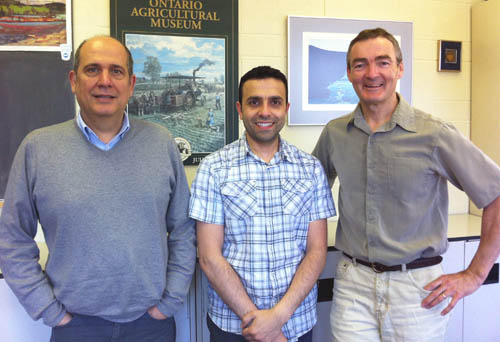Story by Natalie Osborne, a graduate of the SPARK program (Students Promoting Awareness of Research Knowledge)

They may be an ocean apart, but when it comes to science and music, they’re in perfect harmony. Guelph professor Brian McBride and his British colleague Ilias Kyriazakis form the core of an international research collaboration that spans 15 years and 5,500 kilometres.
Together they’ve produced research that informs our understanding of animal health and nutrition. Outside the lab, they share friendship and a mutual passion for music and film that has contributed to the longevity and success of their research partnership.
McBride is a professor in U of G’s Department of Animal and Poultry Science, where Kyriazakis is a visiting professor. In England, Kyriazakis is a professor of animal health and nutrition in Newcastle University’s School of Agriculture, Food and Rural Development. Their research collaboration benefits the health and welfare of livestock, including dairy cows, on both sides of the Atlantic through improved diet and diagnostic tools.
It all started in 1998 when McBride travelled to the University of Edinburgh in Scotland for a sabbatical with Kyriazakis after becoming interested in his research. This was the start of a long-standing, long distance research collaboration covering topics such as diet selection, maternal feeding behaviour and early disease detection in livestock.
“Prof. Kyriazakis provides incredible mentorship to our students. Even many years after graduating, they will travel across the province to see him when he visits Canada,” says McBride.
Kyriazakis has advised or served on the graduate committee for seven of McBride’s students, and this collaboration has generated seven leading-edge papers in the field of animal health and nutrition. One research focus is subacute ruminal acidosis (SARA), a metabolic disease found in high-producing dairy cattle. The cost of SARA is estimated at more than a dollar a day per cow and can lead to systemic infections or laminitis, a common hoof disease.
SARA is caused by over-consumption of highly fermentable grain products, which give cows the energy they need to produce large quantities of milk. When digested, these grains produce excess acid that can damage the rumen’s walls.
McBride and Kyriazakis wanted to investigate if cows with SARA would instinctively eat certain dietary components to counteract these acidotic conditions. The ability to self-medicate with diet has been observed in some wild animals.
In one study, they gave cows with SARA a choice between long alfalfa hay and alfalfa pellets. The long alfalfa hay must be re-chewed by the cow, which introduces saliva into the rumen and helps to neutralize acid. In fact, the cows did prefer the long alfalfa hay to the pellets.
McBride and Kyriazakis have combined the resources and expertise available at their institutions to create research projects with greater impact and wider scope.
“In the U.K., our research focuses more on non-ruminants such as pigs and poultry, so for ruminant digestion work we turn to Prof. McBride and the University of Guelph because it’s a world-class centre for dairy research,” says Kyriazakis. “We’d be very lucky to have Prof. McBride accept visiting professor status here at Newcastle University.”
McBride and Kyriazakis agree that both their universities would benefit from a formal research partnership in the future. U of G and Newcastle University share many similarities, including mission statements about the interconnections between food and animal, human and environmental health.
In addition to similar academic institutions, McBride and Kyriazakis share many personal beliefs about the nature and role of science.
“Oftentimes in science, because objectivity is so important, we forget about expressing ourselves, but good scientists are often also creative people,” says McBride. “Prof. Kyriazakis is one of my closest friends because we share not only a love of science and animals but also a deep appreciation and passion for music and art.”
McBride is an avid finger-style guitarist, Kyriazakis an art enthusiast. They foster their creativity inside and outside of the laboratory and plan many future work projects and discussions about music.